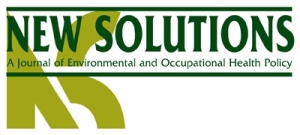New Solutions: The Drawing Board is a monthly feature produced by the journal New Solutions. Read more about it here.
By Alice Shabecoff
As the massive oil slicks from the BP disaster continue to advance upon shores and communities, worries over the effects on wildlife and the natural environment abound, and rightfully so: hailed as the biggest oil spill in our nation's history, much of the damage is irreparable, with more inevitably to come. Yet policy makers, community members and advocates are strangely silent about another unavoidable danger: substantial harm to the children of the coast.
If you can smell oil, chemicals are then in the air and can therefore be inhaled. Parents who are helping to mop up the oil (often reportedly without proper safety equipment) could potentially bring these chemicals into their homes via contaminated skin and clothing. More worrisome is the oil's potential impact on the water supply, affecting communities across the American south.
May 2, 2010 - U.S. Coast Guard Commandant Admiral Thad Allen, who is serving as the National Incident Commander, and EPA Administrator Lisa P. Jackson, brief President Barack Obama about the situation along the Gulf Coast following the BP oil spill at the Coast Guard Venice Center in Venice, La. (Official White House Photo by Pete Souza)
Crude oil is complex mix of hundreds of highly toxic chemicals, including benzene and polycyclic aromatic hydrocarbons, infamous for their capacity to cause cancer and damage to the nervous system. In fact, crude oil components can damage every part of the body, from the reproductive and respiratory systems to the immune system, kidneys, liver and gastrointestinal system. These chemicals disrupt the organs that make up the endocrine system, responsible for mental and physical growth as well as fertility. They also easily penetrate cell walls, damaging cell structure, including DNA.
Children face even greater danger from chemical exposure as a result of their immature bodies, including incompletely formed immune and detoxification systems. The child in the womb is the most at risk. A report recently released by the President's Cancer Panel warns about exposures to chemicals during pregnancy. Harm has already occurred: childhood cancer, once a rarity, has leapt 67 percent over the past twenty years as chemical production escalated. I suspect that we'll see a spike in similar statistics within the Gulf area in years to come.
Why aren't federal agencies discussing this looming health disaster? They need to act swiftly in order to alert local authorities of ways to minimize exposure to residents. People who work with crude oil need to be given protective equipment. Special measures must be taken to protect those most at risk, specifically young children and pregnant women.
Our children's bodies are already dangerously overloaded with toxic substances and far too many, one out of three, are suffering from chronic, sometimes deadly, illnesses as a result.
What will we learn from this disaster? When forming our nation's future energy plan, we must consider the costs of childhood cancer, birth defects, asthma, dwindling male births, and other side effects stemming from chemical and industrial exposure. These are not simply so-called "externalities" that can be disregarded, but rather an integral and real part of our oil dependence. The BP disaster acts as the single-biggest wake-up call our country has seen in recent history, reinforcing that we must act now to phase out oil. We must do this not only for the long-term health of our economy and environment, but also to protect those most vulnerable, and most dear: our children.
For more information: Crude Oil Health Hazards Fact Sheet, by Dr. Michael Harbut (Kamanos Cancer Institute) and Dr. Kathleen Burns (Sciencecorps)
Alice Shabecoff is the co-author with her husband Philip of the just-released book Poisoned for Profit: How Toxins Are Making Our Children Chronically Ill.


Thank you for this post. June 22-23rd the Institute of Medicine held a workshop titled, "Assessing the Human Health Effects of the Gulf of Mexico Oil Spill: An Institute of Medicine Workshop." The roster of speakers, videos and power point presentations are available at on-line at: http://www.iom.edu/Activities/PublicHealth/OilSpillHealth/2010-JUN-22/A…
Included is a presentation by Brenda Eskanazi, Ph.D, titled, Pregnancy and Vulnerability of Children. She summarizes a number of studies with findings associating components of crude oil with adverse pregnancy outcomes. She also summarizes many of the things we do not yet know.
This point about special vulnerability of children is important. Another recent reference is the news story in the Journal of the National Cancer Institute in the August 4 issue. The writer, David Holzman, quotes Ricki Perera, among others.